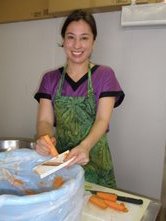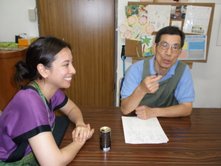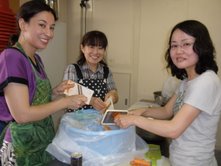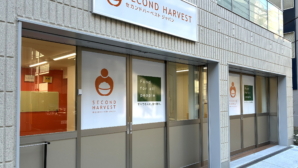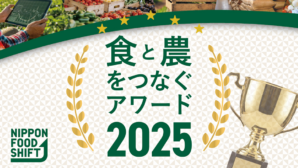2009.7.23
Volunteer interview No. 2: Cylinda Marquart
For the second interview of our series of Volunteer to Volunteer Interviews, Watanabe-sensei talks to Friday morning participant, Cylinda Marquart about her interests in cooking and Second Harvest Japan.
Q: Why are you interested in Food banking?
A: I like food banks because I don’t like wasted food. Watching the news at night we hear about food shortages all over the world, while in developed countries we have so much food that we are throwing it away. Food banks are one way to make sure that we make good use of our resources and spread around our wealth to those who need a hand. As a child, my family and I helped out at soup kitchens for the homeless. Everyone was full of smiles and gratitude as they served and shared a meal together. At university, I’d often have “The Dollar Lunch” at a church across the street from my school. The church received food donations from local supermarkets and food distributors and cooked cheap, delicious and nutritious lunches for college students and the poor. No one was ashamed to be eating a cheap lunch, but instead they were happy that the food wasn’t being thrown away. In the last few years I’ve gotten involved with “Share Our Strength” an American food bank that wants to eradicate childhood hunger in the US. http://strength.org/
Q: Food seems to be really important to you; did something growing up make you feel this way?
A: I come from a multi-cultural family that includes French, German and Chinese. Because of my father’s work we often met other families from different countries. With so many different cultures, the one ‘universal language’ people could share was food. There would be parties with people eating American-style fried chicken and potato salad, next to Korean kimichi and German sauerkraut. I’ve seen pictures of my third birthday party, and I’m eating sushi. Food was also important to me because it was the only way I could communicate with my maternal grandmother, who is from Hong Kong. Through her very complex and elaborate Cantonese-style cooking, I had my first gourmet experience.
Q: Tell us about your time in Japan and thoughts about the food culture here.
A: I moved to Japan from Taiwan, where I had been working in publishing and broadcasting. My life had been quite fast-paced and marrying and moving to rural Fukuoka gave me time to slow down. My first friend was my neighbor who brought me vegetables from her hatake (field) and home-style Japanese food like nikku jagga and tsukemono. Ikeda-san’s food was all organic, seasonal and of course, locally-grown. Because of Ikeda-san’s perfect ingredients and all the care she took in growing vegetables I became more and more inspired to put the same kind of energy into my cooking. Ikeda-san’s secret ingredient was ‘love’; it was the same love I tasted in my grandmother’s cooking and also what I try to bring to my vegetable chopping at 2HJ.
Q: What do you do at 2HJ?
A: About two or three times a month I join the Friday morning cooking crew in chopping vegetables and preparing the ingredients for Saturday’s meal distribution. From time to time I’ll bring friends to 2HJ so they can practice their cooking skills, too. The mornings go by very quickly as we stand around the tables chopping and laughing, telling stories and adding that special ingredient to all of our cooking.
Cylinda is a writer & editor that has been living in Japan for five years. Last year she started food consulting and a personal chef service. Check out her blog of recipes and food philosophies at: http://lovesoupcooks.typepad.com/

